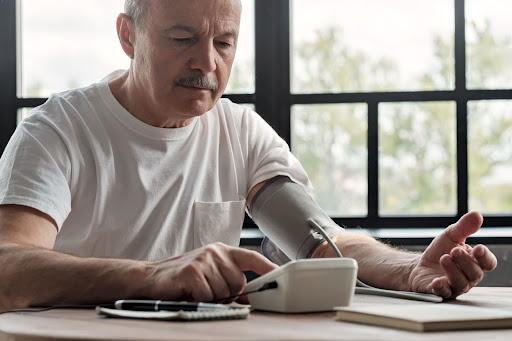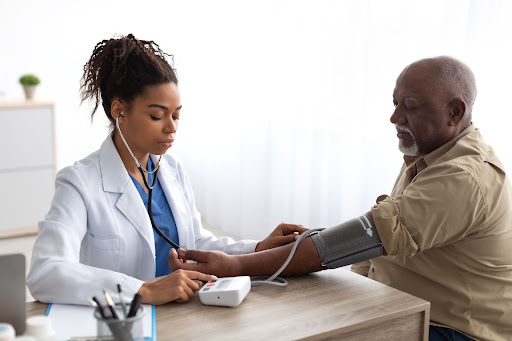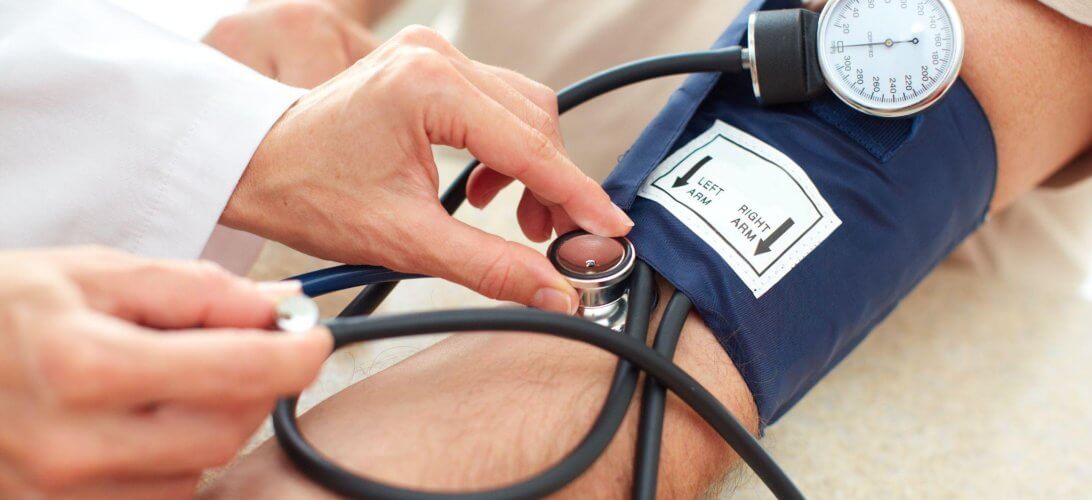Highlights
- Hypertension is extremely common, with at least one billion adults around the world experiencing it.
- Hypertension has no symptoms itself. Instead, it can aggravate other serious medical conditions, making it one of the key causes of premature death.
- Hypertension can be easily treated through lifestyle changes and use of hypertension medications.
Hypertension, also called high blood pressure, is a condition where the blood pressure in your arteries is elevated over a long period of time. While hypertension generally has few symptoms, it can be a source of serious concern if you are at risk for heart disease, stroke, kidney disease, vision problems, or dementia.
Diagnosing and treating hypertension is key to your well-being. In this article, we’ll discuss the causes, diagnosis, and treatments for hypertension.
Causes of Hypertension
At the chemical and mechanical level, your blood pressure is dictated by two main factors. The first is the pliability of your arteries. The more flexible your arteries are, the less pressure is needed to push your blood through your body.
The second is the salinity of your blood. Sodium in the blood is regulated by the kidneys, which receive blood through the arteries and filter out waste products which head to the bladder. The more salt is in the blood, the more work the kidneys have to do to filter it out, often at the expense of retaining fluid. There is also increasing evidence that high sugar intake can affect blood pressure, although precisely why is still a matter of debate.
There are two kinds of hypertension: primary and secondary. Secondary hypertension has an identifiable cause, such as kidney disease, pregnancy, and even excessive consumption of certain foods and drinks, like licorice or alcohol. Usually, treating the cause will resolve the hypertension issue.
Primary hypertension is not caused by a disease, and understanding of it is still changing as a result. It’s believed to be caused by a confluence of risk factors in addition to being a natural part of the aging process.

Symptoms of Hypertension
In most cases, hypertension has no obvious symptoms, and many people only learn they have it in the course of their annual physical or when being examined for another problem. It’s estimated by the WHO that less than half of people with hypertension have it diagnosed and treated.
Some patients self-report headaches, lightheadedness, vision problems, or fainting. It’s not clear if these are symptoms of hypertension itself or if they’re caused by outside factors or the stress of diagnosis, a phenomenon called “white coat hypertension.”
Diagnosis of Hypertension
Hypertension is usually diagnosed across at least two visits and three measurements of arterial blood pressure. It’s not recommended to check your blood pressure yourself unless advised to do so by a doctor, as factors such as medications and emotional state can temporarily raise or lower your blood pressure.

Risk Factors for Hypertension
Both primary and secondary hypertension have a number of risk factors. Some you can change, and others you simply need to be aware of.
Age
Our blood pressure naturally rises as we age, regardless of other factors. This is due to arteries losing their pliability; even a person in otherwise perfect health is going to see some increase in their blood pressure as they age.
Smoking
One of the most effective ways to control blood pressure is to quit smoking. Nicotine narrows your blood vessels, raising the pressure and putting stress on your cardiovascular system.
Body Weight
High body weight, especially obesity, is theorized to raise blood pressure through a number of causes, such as compressing the kidneys and changing hormone signals. Being overweight also causes insulin resistance, which is another factor in hypertension.
Genetics
While research is ongoing, it appears that there’s a genetic component to hypertension. How much genetic history affects the condition, and why, remains up for debate. Research is ongoing.
Alcohol and Drug Use
Alcohol and street drugs, such as cocaine, have an impact on blood pressure in both the short and long term. Alcohol, in particular, can drive up the levels of hormones that constrict blood vessels.
Finally, contrary to popular belief, there is no evidence that a stressful job or personal situation contributes to hypertension. Instead, it’s how you manage that stress that matters.

Potential Complications of Hypertension
Think of hypertension as similar to wear and tear on your car. If you drive your car on rough terrain, it will seem fine for a while, but if you do it all day, every day, eventually the stress will begin to show in other places without any one obvious cause. Hypertension has the same effect on your body.
In most cases, complications are found while treating other diseases. For example, treating hypertension when you have a family history of stroke lowers your chances of having a stroke and decreases the odds of a second stroke. Lower blood pressure reduces the chance of a hemorrhage and keeps the arteries from narrowing, making infarction less likely.
Treatment of Hypertension
One of the first steps any doctor will advise is adopting the “big four” lifestyle changes: Quitting smoking, reducing alcohol consumption, eating a healthier diet, and getting more exercise. Diet and exercise reduce the amount of salt and sugar you eat while keeping your circulatory system active.
While you’re taking these steps, your doctor will likely prescribe medication to limit your blood pressure. Several classes of medication are used to treat hypertension, including:
- Diuretics. These medications lower blood pressure by helping the body get rid of excess fluid and sodium.
- Alpha blockers and beta blockers. These drugs interact with adrenaline and norepinephrine to keep your heart pumping at a steady pace and limit stress on the overall system.
- Angiotensin-converting enzyme (ACE) inhibitors and angiotensin receptor blockers (ARBs). These classes of medications prevent blood vessels from constricting, keeping blood pressure low.
- Calcium channel blockers. CCBs keep calcium out of the heart, as calcium can cause the heart and arteries to squeeze tightly.
Learn more about the medications available to treat hypertension and how to get the best price with BidRx. Find your medications and create a bid today so pharmacies around the country will compete for your business, allowing you to fill your prescriptions at the lowest possible price.
